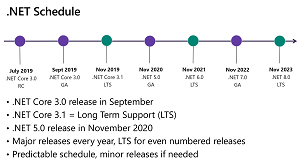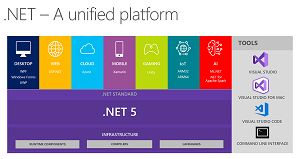News
COVID-19 Delays Unifying .NET 5 Features
.NET 5 will still ship this November, but it won't have all the unifying "just one .NET going forward" functionality that Microsoft originally planned because of delays caused by the COVID-19 pandemic.
Some features originally planned for .NET 5 in November 2020 are now slated for .NET 6 in November 2021.
"Last year, we laid out our vision for one .NET and .NET 5," said Scott Hunter, director of program management, .NET, in a post published during the company's Build developer conference. "We said we would take .NET Core and Mono/Xamarin implementations and unify them into one base class library (BCL) and toolchain (SDK).
"In the wake of the global health pandemic, we've had to adapt to the changing needs of our customers and provide the support needed to assist with their smooth operations. Our efforts continue to be anchored in helping our customers address their most urgent needs. As a result, we expect these features to be available in preview by November 2020, but the unification will be truly completed with .NET 6, our Long-Term Support (LTS) release. Our vision hasn't changed, but our timeline has."
 [Click on image for larger view.] The .NET Schedule (source: Microsoft).
[Click on image for larger view.] The .NET Schedule (source: Microsoft).
Hunter made those comments in an announcement of .NET 5 Preview 4, wherein he detailed .NET 5 highlights, many of which are included in the new preview. These include:
 [Click on image for larger view.] .NET 5 (source: Microsoft).
[Click on image for larger view.] .NET 5 (source: Microsoft).
Hunter also announced that the Windows Forms designer for .NET Core projects is now available as a preview in Visual Studio 2019 version 16.6, also released today.
Much other news was packed into the huge post, augmented by release notes.
"NET 5.0 is shaping up to be another big foundational release, much like .NET Core 1.0, 2.0 and 3.0," Hunter said in conclusion. "It includes many new improvements that should make your applications and development process better and easier. Much of the team has been working on .NET 5 since before we released .NET Core 3.0. We've been looking forward to releasing all these improvements in a near-final form for many months, and will now watch for your feedback as you try them out."
About the Author
David Ramel is an editor and writer at Converge 360.